- Home
- John Jakes
California Gold Page 3
California Gold Read online
Page 3
A lantern swung to and fro between the train and the utility shed of a small coaling station. It belonged to the brakeman, who’d run up from the caboose. The engineer and firemen crunched the snow as they hurried back to join him, their voices carrying clearly in the still night.
“Saw him when he peeked out, Seamus. Hold my lamp while I get my truncheon.”
Mack clung in the shadow just inside the shed, squinting against the headlight. The freight car door rolled back noisily.
“All right, you. Get out of there. Out, I say. There’re three of us, one of you.”
That convinced the stowaway; a shadow shape in the steam jumped down. Landing off balance at the edge of the long snowy incline that sloped away from the track, he groped for the freight car to steady himself. The brakeman said, “No free rides on C. P. Huntington’s line, mister.” Mack blinked at the sound of the truncheon striking the stowaway’s bare head.
The man groaned and swayed toward the slope. Laughing, the engineer kicked the man’s rear and the brakeman clubbed him again. That pitched him over with a muffled cry. Down the slope he went, rolling, stirring up clouds of snow. Mack heard another strident yell from below, then silence.
The train crew exchanged comments he couldn’t hear as they returned to their posts. The brakeman stopped to urinate in the snow, then climbed aboard and waved his lantern. As the locomotive drivers shunted back and forth, the engineer sounded the whistle, and its throaty wail reverberated through the mountain fastness. Now the train came chugging toward Mack, its headlight reflecting on the two steel concaves of the jutting snowplow. For a moment they flashed like mirrors.
As Mack grabbed the beam at the end of the shed and swung around to the outside, his shoe slipped and he nearly fell. Clinging to the outside of the shed, he twisted to look over his shoulder. A chasm. Just a black chasm. God…
Chugging, rumbling, the work train entered the shed. Mack couldn’t help coughing loudly in the thick steam and coal smoke, but the train’s noise was so great, no one heard. His nose ran and his teeth chattered. The train passed.
He didn’t fancy himself a Samaritan, but he couldn’t abandon whoever had tumbled down the slope. Carefully he swung himself back around to the track and trotted forward, alone in darkness seven thousand feet above sea level. Some clouds, like gauze veils, parted and revealed the stars and a few last snowflakes settled. The night remained absolutely still. The starlight helped him find the spot where the stowaway had disturbed the snow in jumping from the train. From there, Mack started working his way down the slope. The snow was three to four feet deep and the footing beneath uncertain. He felt the snow soaking his trousers again; he’d spent most of the winter either soaked or drying out. At the bottom, among some boulders, he found more disturbed snow, but no human being. Eyeing the track the man’s body had left and where it stopped, he knelt and began to dig with his fringed gauntlets.
He felt something firm in the drift, and sucked in breath. It was an arm, and it was limp. He dug faster.
Mack broke into the utility shed and found a lantern with oil in it. After lighting it, he moved shovels and picks to clear a section of wall, then dragged the man inside, propped him up, shut the door, and turned up the lamp to see him more clearly.
The traveler was about Mack’s age, with a delicate, pale face reddened by the weather, and he was clearly emaciated. Yet there was a vigorous and flamboyant handsomeness about him, heightened by thick black eyebrows and shaggy, shiny hair. Light stubble indicated he had shaved not too long ago. He wore a ragged army overcoat, trousers with a large black check on a gray background, and calf-high laced boots.
He groaned and leaned his head back, bumping it on the wall.
“You ought to rest,” Mack said. He picked up the man’s left wrist. “Anything broken?”
The traveler’s eyes flew open; they were blue, innocent and disarming as a child’s. He felt Mack’s hand on his wrist and, struggling to get upright, he swung a fist at Mack’s head.
Mack rocked back on his heels, ducking the punch, then grabbed the man’s right arm before he could deliver another. The man’s eyes caught the beam of the lantern and changed from blue to an opal blaze, like a cat’s reflecting light. For a moment he looked not quite human.
“Listen,” Mack said quickly. “I’m not a railroad man. I’m a traveler like you.”
“You’re—?” Mack felt the tension leave the stranger’s arm. He opened his fist and Mack let go.
“I dug you out of the snowdrift down there,” Mack went on. He noticed some tiny ruby droplets hiding in the man’s snow-dampened hair. “Looks like you’ve got a cut. Let me see.”
Warily, the man bowed his head, while Mack parted his hair. The cut was about two inches long, not deep, but leaching blood and full of dirt.
“I’ll wash it out.” Mack fetched a handful of snow from outside. Far away, something wild bayed, an angry sound. A wildcat up this high? Or a trick of the wind?
Mack removed the roll of extra shirts from his back. He’d been reducing one shirt piece by piece for rags and bandages, and now he ripped off another section, wet it with snow, and washed the cut. “I don’t have anything to clean it better.”
“I do.” The man fished under his army coat; he seemed surprisingly alert. Handing Mack a small brown bottle, he said, “Don’t use too much.”
Mack poured a few drops of the strong-smelling whiskey into the cut. The man clenched his teeth but made no sound. He had perfect white teeth to go with his perfect features. Mack had no hope of ever being so handsome.
He opened his bandanna to find a knuckle-sized hunk of goat cheese peppered with blue-green mold spots. “Eat this, you’ll feel better.”
“I don’t want to take a man’s last food.” But he snatched the cheese and bit it in half, chewing hard.
Mack chuckled. The man shot him a fiery look. Mack waved. “Go on, finish it. I’ve been walking for five or six months—I haven’t starved yet.”
Presently the man finished the cheese and wiped his mouth. “Thanks for pulling me out. Suppose I should introduce myself. Wyatt J. Paul. J for Junius. I’m from Osage, Kansas. Nobody ever heard of it.”
“Chance is my name. James Macklin Chance, but that’s too long. I go by Mack.”
They shook hands. The young man from Kansas had a powerful grip.
“Where you from, Chance?”
“Pennsylvania. Schuylkill County coal fields”
“Are you bound for California like I am?”
“Yes, San Francisco.”
“I’m going down south.” Wyatt Paul wiped his nose, showing his white glistening teeth again. “But it’s all the same sunshine. Pure gold. I’d say we should get moving and find it—what do you think?”
“In the morning, when there’s light. Get some sleep.”
“You in the habit of telling other people what to do?” Wyatt Paul’s face froze momentarily into ugliness again, then he recovered. “Sorry—I didn’t mean that. I’ve ridden the cars all the way here, and those three are the first who managed to roust me. If l had them here I’d crack their heads.”
“Sure, I feel the same way,” Mack said, though he didn’t. He reached for the lantern and blew it out. The innocent blue eyes simply vanished. It gave him an eerie feeling.
Somewhere the wild animal screamed again.
Snow fell in bleak gray twilight. It had been coming down a long time. Mack’s teeth hadn’t stopped chattering for hours. Bad as Pennsylvania, he thought.
They had been traveling together for two days, climbing, descending, following great horseshoe curves in the main track. Now Wyatt spied a wooden trackside marker, stumbled to it through the drifts, and brushed off the snow.
CALIFORNIA STATE LINE
Little bits of melting snow fell off his face as he tried to smile. “We ought to whoop it up,” he said listlessly.
“Not yet. Keep going.”
Wyatt was too spent and starved to show any resentment of the o
rder. Mack trudged by him, back to the center of the track, and together they continued west through the storm.
Two figures broke through the rolling white mist, crunching the shallow mounds of snow, and disturbing half a dozen mountain bluebirds, which shot upward in alarm. The men resembled walking rag heaps, with only the gleam of eyes and the pale flash of bare hands to indicate otherwise.
Mack went faster than Wyatt down the slope. He’d never inhaled such a sweet aroma as that which breathed out from the forest of smooth- and rough-barked trees, giant knobcone pines and tamaracks, white firs and mountain hemlocks.
“My God, Wyatt, just look at that,” he shouted, pointing below, where the forest gave way to a field of breaking mist glowing more golden in the sun as he watched. “It’s California. The real thing.” He flung off the buffalo-hair overcoat, feeling his fatigue, hunger, and pain drop away with it. The tangle of rags and leather scraps on his feet, brown from dried blood, raked a trail in the snow as he raced downward.
“Jesus, Jesus. Feel that sunshine.” A dozen yards behind, Wyatt laughed like a boy and turned in a circle, doing a crazy little dance.
They came down from the forested slopes to the low emerald-green foothills while lances of sunshine pierced the mist. Laughing and capering, they flung off more of their stinking rags, here a grimy pile of them, there another. Mack squinted at the sun and turned his face up to it. He felt the warmth, the blessed warmth.
On the breasts of the sweet green hills, yellow blossoms tossed and swayed in a balmy wind. To complement the wild mustard there was fire-colored redbud, purple and pink lupine, deep blue brodiaea, and the white of cow parsnips, a rainbow sea rolling on and on to the west. In the distance, dark specks clustered here and there on a flat tawny-gold plain. Cattle?
Mack stopped among the wildflowers and turned about. Looking back at where they’d come from—the deep green Sierra slopes and, above, the sharp snowy peaks proud against a sky clean and blue like none he’d ever seen before—made his heart surge. He felt new in a way he could not put into words. All of the blind hope of the past was at last made real.
A huge shadow flashed across his upturned face. It was a golden eagle flying back to its mountain home. How wide were its wings? Three feet? Four? He’d never seen such a magnificent bird. Tears sprang to his eyes and, for once, he wasn’t ashamed, though it was fortunate Wyatt had run to the next hill. This feeling of exaltation shook Mack profoundly. The mountains and the forests and the golden plain said this place demanded the best of a man.
He’d try to be worthy of that heart-pounding beauty. He was being reborn. He was becoming a Californian.
Three nights later, by a comforting campfire of brush and pinecones, they dined royally on two brown trout Wyatt had caught and cleaned with his clasp knife. Mack was envious; a combination of poverty and cold weather had confined him for eighteen years, and he knew nothing of fishing, hunting, the outdoors. Wyatt knew a lot. He said the wild mustard plants were edible, so they had a small tangy-bitter salad of greens on the side.
They fell to talking about their respective pasts, something they’d been too tired and desperate to do before. Mack described his father, the Argonaut breaking his back day after day in the anthracite mine and living for one thing: to pass on to his son the dream of going to California and making the fortune he’d failed to find.
“Pa had a lot of books about California, but this was his favorite.” He showed Wyatt the guidebook. “It’s kept me going because it promises that you don’t have to be hungry or poor out here. And you don’t have to mess with snow.”
Wyatt’s blue eyes regarded him with a mixture of amusement and—perhaps—scorn. He asked to see the book and Mack reluctantly handed it to him. Wyatt leafed through the pages.
“ ‘As I continued my pere…peregrinations’—what’s that mean?”
“I don’t know.”
“ ‘…from camp to camp, and saw the hoards of gold, some of it in flakes but the greater part in a coarse dust, it seemed as if the fabled treasures of the Arabian nights had suddenly been realized. Of course those already here expect to be…’ ” Vexed again, he showed Mack the word.
Mack sounded it out. “In-un-dated.” He shrugged. Wyatt seemed pleased by Mack’s ignorance.
“ ‘…inundated with emigrants from every part of the globe. But truly, based upon my experiences, I pledge to you that there is gold enough for all.’ ”
He closed the book and Mack was relieved to take it back. “Do you believe all that stuff?” Wyatt asked. “I mean, the way my old man believed in the Bible?”
Mack shrugged to hide his embarrassment. At a very deep level, beyond words, he did believe. “Don’t you?”
Wyatt studied the stars. “I believe I’m going to do things differently than my old man. I believe that I can, out here.”
“What do you mean?”
The swarthy young man brushed fish bones and skin from the flat rock at his feet. “My old man never made a dollar that he kept. He was a part-time preacher in Kansas, and of course he was too damn righteous to take any pay for that. He had a trade on the side—rainmaker. He had a whole collection of brass rods and forked sticks, and he said he’d talked to God and God approved of the calling.”
“Did he make a lot of rain?”
“Never any that I remember. God didn’t either.” Wyatt was amused by his own wit, but it made Mack uncomfortable. “My old man earned about as much cash from rainmaking as he did from shouting about Jesus and the Holy Ghost. Of course it didn’t make any difference in our house if you prospered, so long as you were righteous.” He pronounced the word sarcastically. “That was my mother’s attitude. She was worse than the old man. She got my two older sisters to swallow her fairy tales, but I was ten years younger. I guess she was tired out, or I was smart, because I saw it for what it was. A Barnum show. A fucking humbug, you know?”
Just then some deep-throated bird, a horned owl perhaps, made its presence known. The night smelled of sweet grass and the pine forests to the east.
“I’m telling you, my mother was a strange woman,” Wyatt went on. “She never served red meat in our house. She said it liberated the base instincts of males. She believed in hydropathy—the water cure. I was a sickly kid, so for a long time I had to sit wrapped up in sheets she soaked in cold water and wrung out. One hour a day, even in winter. You don’t know the crazy ideas I grew up with.…”
Mack sat silently. Wyatt added, “I came out here to get away from them, and all the rules in our house. Don’t drink, don’t curse, don’t fornicate, and you’ll get your reward. Where? Not in Osage, Kansas, that’s for goddamn sure. But California—now that’s a different story.”
More cheerful and animated now, Wyatt hunched forward. “Let me explain what this place means to me. My old man had one big opportunity in his life. His brother from Topeka died and left him forty-five acres of prime land at the edge of town. My old man platted it, laid out a nice little section of houses, and then found out that some of the local ordinances wouldn’t allow him to do certain things he planned. Being devout, he couldn’t break the law. So he prayed about it all night one night, and next day he sold the whole parcel. And of course the smart bastard who bought it just walked in and bribed the Topeka officials and even a state senator, and developed the section and sold it out at a profit.”
Wyatt’s sudden smile fooled Mack into expecting easiness, even forgiveness, but Wyatt’s words turned bitter again. “You see what kind of fucking fools raised me? Fools hemmed in by the Bible, a conscience—laws. I’ll not repeat their mistakes.”
“So what do you want to do here?” Mack asked gingerly.
“Buy and develop some land. It was the one sensible thing my old man tried. He just did it wrong.”
“And you’re going down to Los Angeles?”
“For a start. Big land boom down there. Fewer people, too.” He studied Mack. “What’s your plan?”
“The same as yours. To make mone
y.”
“How much?”
“A fortune.”
Wyatt tossed his head back and laughed. “We’re alike, Chance. A lot alike. Two gents with high ambitions. It’s no wonder we met on the road to California. This state’s pretty near brand new. Some parts are still frontier, they say. Not so many rules and laws to bind a man—”
“That’s what you think of California? Being free to do whatever you want?” It was an odd new thought.
Wyatt obviously believed it, though, because he responded heatedly. “Damn right. California is Kansas forty years ago. Maybe with those mountains standing up there, keeping out most of the weaklings, it’ll stay that way. At least I hope it stays that way till I make my pile. That won’t be long.”
“You’re pretty confident.”
Wyatt took the compliment with another toss of his dark head, as if it were routine, nothing but obvious truth.
With the occasionally foolish enthusiasm and naïveté of young men, they continued exchanging information and philosophies for another half hour. They were arguing the merits of California above and below the Tehachapi Mountains, the state’s mythical dividing line, when Mack suddenly stopped and yanked at the dirt-splotched cuff of his trousers. There was some mite of an insect burrowing under his layers of socks, and he killed it between his fingernails. “God, what I’d give for a bar of soap and some hot coffee.”
“I can take care of that first thing in the morning,” Wyatt said.
“How?”
“Didn’t you see that sign we passed at the crossroads—‘Good Luck, two miles’? Bet it’s an old mining town. I’ll go in and get us some supplies.”

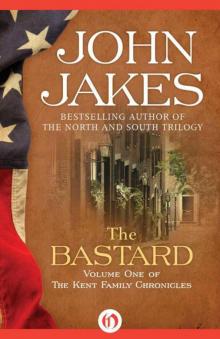 The Bastard
The Bastard The Furies
The Furies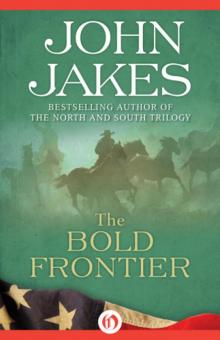 The Bold Frontier
The Bold Frontier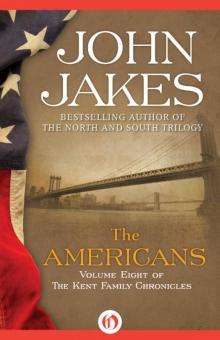 The Americans
The Americans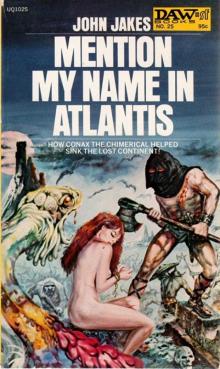 Mention My Name in Atlantis
Mention My Name in Atlantis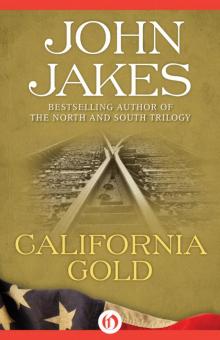 California Gold
California Gold North and South
North and South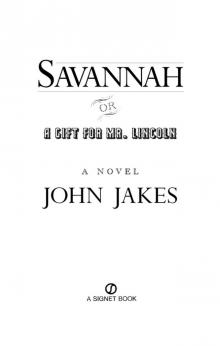 Savannah, or a Gift for Mr. Lincoln
Savannah, or a Gift for Mr. Lincoln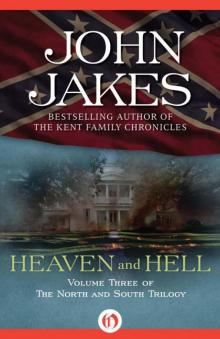 Heaven and Hell
Heaven and Hell Homeland
Homeland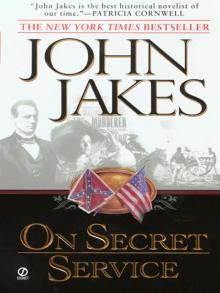 On Secret Service
On Secret Service The Lawless
The Lawless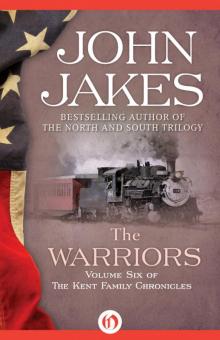 The Titans
The Titans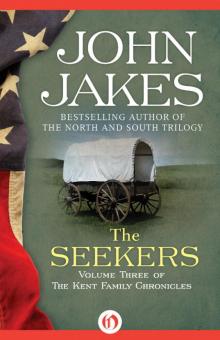 The Seekers
The Seekers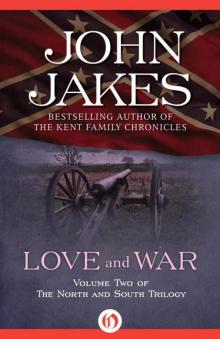 Love and War
Love and War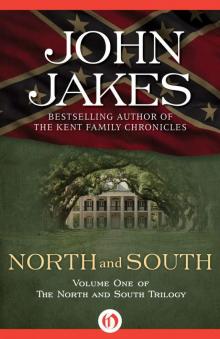 North and South: The North and South Trilogy (Book One)
North and South: The North and South Trilogy (Book One)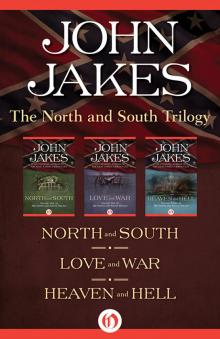 North and South Trilogy
North and South Trilogy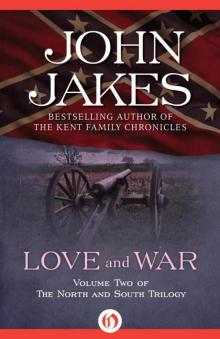 Love and War: The North and South Trilogy
Love and War: The North and South Trilogy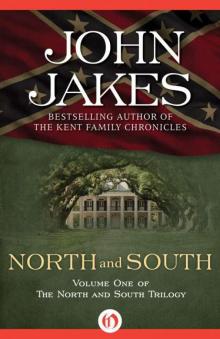 North and South: The North and South Trilogy
North and South: The North and South Trilogy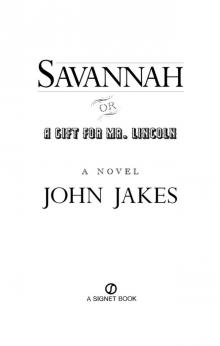 Savannah
Savannah Lawless
Lawless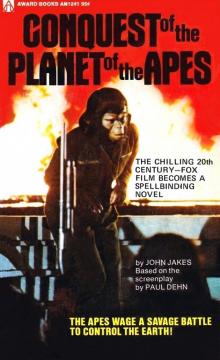 Conquest Of The Planet Of The Apes
Conquest Of The Planet Of The Apes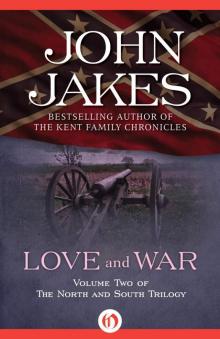 Love and War: The North and South Trilogy (Book Two)
Love and War: The North and South Trilogy (Book Two)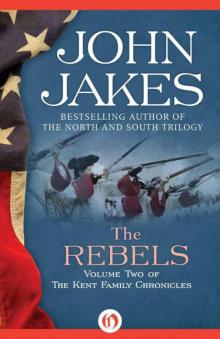 The Rebels: The Kent Family Chronicles
The Rebels: The Kent Family Chronicles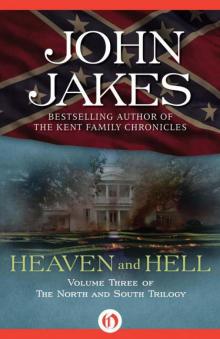 Heaven and Hell: The North and South Trilogy
Heaven and Hell: The North and South Trilogy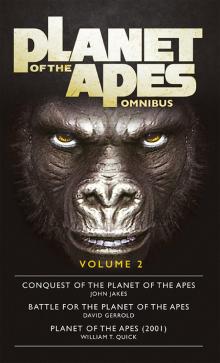 Planet of the Apes Omnibus 2
Planet of the Apes Omnibus 2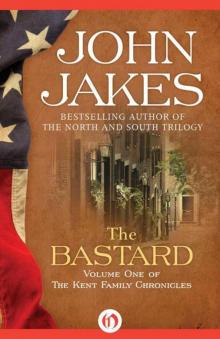 The Bastard: The Kent Family Chronicles
The Bastard: The Kent Family Chronicles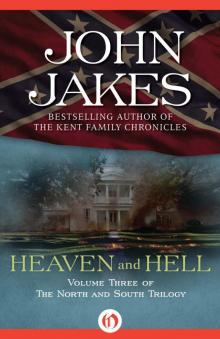 Heaven and Hell: The North and South Trilogy (Book Three)
Heaven and Hell: The North and South Trilogy (Book Three)